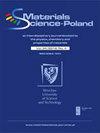Effect of saccharin addition on formation, wear and corrosion resistance of electrodeposited Ni-Cr coatings
IF 1.3
4区 材料科学
Q4 MATERIALS SCIENCE, MULTIDISCIPLINARY
引用次数: 0
Abstract
Numerous factors play a pivotal role in shaping the mechanical and corrosion resistance properties of electrodeposited Ni-Cr alloy coatings. This study delves into the deposition of Ni-Cr alloy coatings on AISI 1040 steel, examining the influence of saccharin additives within the electrodeposition bath. Specifically, the concentration of saccharin within the solution was varied over a range of 0 to 2 g/l. Following the electrodeposition process, a comprehensive array of characterization techniques was employed, encompassing 2D surface roughness analysis, scanning electron microscopy, X-ray diffraction, nanoindentation, energy-dispersive X-ray spectroscopy and assessments of wear and corrosion performance. The characterization results of this article reveal a compelling difference between saccharin-free Ni-Cr coatings and their saccharin-modified counterparts. Notably, microcracks, a common occurrence in saccharin-free coatings, were suppressed in the saccharin-modified Ni-Cr coatings. Additionally, the latter exhibited a smoother and more uniform surface texture. A crucial observation was that the introduction of saccharin into the bath was directly associated with an increased incorporation of chromium within the coatings, resulting in higher nanohardness values. Furthermore, the residual stress within the coatings shifted from tensile to compression as saccharin concentrations increased. Concurrently, surface roughness and wear rates exhibited a consistent downward trend with increasing saccharin concentrations in the solution. The most significant findings were seen in the domain of corrosion resistance. Saccharin-modified Ni-Cr coatings outperformed the bare steel substrate and saccharin-free Ni-Cr coatings. Intriguingly, the enhancement of corrosion resistance was not linearly proportional to saccharin concentration; the optimal corrosion resistance was achieved at a concentration of 1 g/l.添加糖精对电沉积镍铬涂层的形成、磨损和耐腐蚀性的影响
在形成电沉积镍铬合金涂层的机械性能和耐腐蚀性能方面,有许多因素起着关键作用。本研究深入探讨了在 AISI 1040 钢上沉积镍铬合金镀层的过程,研究了电沉积槽中糖精添加剂的影响。具体而言,溶液中糖精的浓度在 0 至 2 克/升的范围内变化。电沉积过程结束后,采用了一系列全面的表征技术,包括二维表面粗糙度分析、扫描电子显微镜、X 射线衍射、纳米压痕、能量色散 X 射线光谱以及磨损和腐蚀性能评估。本文的表征结果揭示了无糖精镍铬涂层与糖精改性涂层之间的显著差异。值得注意的是,无糖精镀层中常见的微裂纹在糖精改性镍铬镀层中得到了抑制。此外,后者的表面纹理更平滑、更均匀。一个重要的观察结果是,在镀液中加入糖精直接增加了镀层中铬的含量,从而提高了纳米硬度值。此外,随着糖精浓度的增加,涂层内的残余应力也从拉伸应力转变为压缩应力。同时,随着溶液中糖精浓度的增加,表面粗糙度和磨损率呈现出一致的下降趋势。最重要的发现体现在耐腐蚀性方面。糖精改性镍铬涂层的性能优于裸钢基体和不含糖精的镍铬涂层。有趣的是,耐腐蚀性的增强与糖精浓度并不成正比;最佳耐腐蚀性是在糖精浓度为 1 克/升时达到的。
本文章由计算机程序翻译,如有差异,请以英文原文为准。
求助全文
约1分钟内获得全文
求助全文
来源期刊

Materials Science-Poland
MATERIALS SCIENCE, MULTIDISCIPLINARY-
自引率
18.20%
发文量
18
期刊介绍:
Material Sciences-Poland is an interdisciplinary journal devoted to experimental research into results on the relationships between structure, processing, properties, technology, and uses of materials. Original research articles and review can be only submitted.
 求助内容:
求助内容: 应助结果提醒方式:
应助结果提醒方式:


